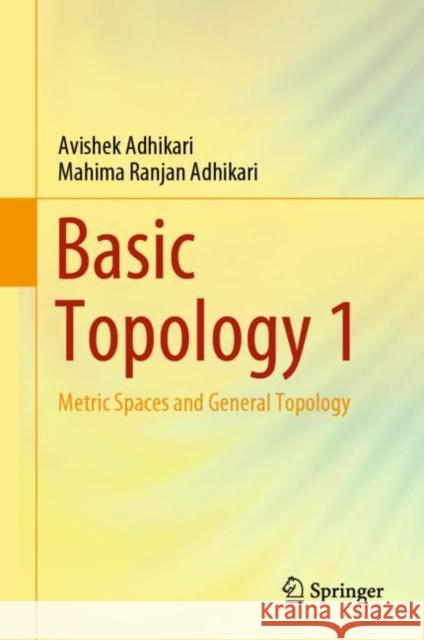Basic Topology 1: Metric Spaces and General Topology » książka



Basic Topology 1: Metric Spaces and General Topology
ISBN-13: 9789811665080 / Angielski / Twarda / 2022 / 502 str.
Basic Topology 1: Metric Spaces and General Topology
ISBN-13: 9789811665080 / Angielski / Twarda / 2022 / 502 str.
(netto: 287,51 VAT: 5%)
Najniższa cena z 30 dni: 269,85
ok. 16-18 dni roboczych.
Darmowa dostawa!
"With an encyclopedic range of topics and terse exposition, Basic Topology 1 may make a reasonable reference for self-motivated learners ... ." (Timothy Clark, MAA Reviews, March 20, 2023)
1. Prerequisites: Sets, Algebraic Systems, and Classical Analysis.- 2. Metric Spaces and Normed Linear Spaces.- 3. Topological Spaces and Continuous Maps.- 4. Separation Axioms.- 5. Compactness and Connectedness.- 6. Real-valued Continuous Functions.- 7. Countability, Separability and Embedding.- 8. Brief History of General Topology.
AVISHEK ADHIKARI, Ph.D., M.Sc. (Gold Medalist), is Professor at the Department of Mathematics, Presidency University, Kolkata, India. A recipient of the President of India Medal, ISCA Young Scientist Award, and the NANUM Fund by International Mathematical Union, Professor Adhikari did his Ph.D. from the Indian Statistical Institute, India, under the guidance of Professor Bimal Roy, the former Director of the Indian Statistical Institute. Earlier, Professor Adhikari was a faculty member at the Department of Pure Mathematics, University of Calcutta, Kolkata, from July 2006–January 2019. He is the founder Secretary of the Institute for Mathematics, Bioinformatics, Information Technology & Computer Science (IMBIC), India, having branches in Sweden and Japan, and the Treasurer of the Cryptology Research Society of India. He was the former Eastern Zonal coordinator of the M.Sc. and Ph.D. scholarship examinations by the National Board of Higher Mathematics (NBHM). He was a Post-Doctoral fellow at INRIA-Rocquencourt, France, and Visiting Scientist at Linkoping University, Sweden; Indian Statistical Institute, Kolkata. Professor Adhikari delivered invited talks at various universities and institutions abroad.
He has authored four textbooks on mathematics including Basic Modern Algebra with Applications (Springer, 2014) and edited two volumes including Mathematical and Statistical Applications in Life Sciences and Engineering (Springer, 2017). His research papers have been published in reputed international journals, conference proceedings and contributed volumes. Professor Adhikari is one of the investigators of the twelve sponsored research projects funded by agencies like DRDO, WESEE (the Ministry of Defense), DST, DIT, NBHM of the Government of India, including two international collaborative projects supported by DST-JSPS and DST-JST (both Indo-Japan projects). Five of his Ph.D. students have already been awarded degrees, and two of the students have submitted their theses and, currently, three Ph.D. scholars are conducting research under his supervision.
MAHIMA RANJAN ADHIKARI, Ph.D., M.Sc. (Gold Medalist), is the founder president of the Institute for Mathematics, Bioinformatics and Computer Science (IMBIC), Kolkata, India. He is a former professor at the Department of Pure Mathematics, University of Calcutta, India. His research papers are published in national and international journals of repute, including the Proceedings of American Mathematical Society. He has authored nine textbooks and is the editor of two, including: Basic Modern Algebra with Applications (Springer, 2014), Basic Algebraic Topology and Applications (Springer, 2016), and Mathematical and Statistical Applications in Life Sciences and Engineering (Springer, 2017).
Twelve students have been awarded Ph.D. degree under his guidance on various topics such as algebra, algebraic topology, category theory, geometry, analysis, graph theory, knot theory and history of mathematics. He has visited several universities and research institutions in India, USA, UK, Japan, China, Greece, Sweden, Switzerland, Italy, and many other counties on invitation. A member of the American Mathematical Society, Prof. Adhikari is on the editorial board of several journals of repute. He was elected as the president of the Mathematical Sciences Section (including Statistics) of the 95th Indian Science Congress, 2008. He has successfully completed research projects funded by the Government of India.
This first of the three-volume book is targeted as a basic course in topology for undergraduate and graduate students of mathematics. It studies metric spaces and general topology. It starts with the concept of the metric which is an abstraction of distance in the Euclidean space. The special structure of a metric space induces a topology that leads to many applications of topology in modern analysis and modern algebra, as shown in this volume. This volume also studies topological properties such as compactness and connectedness. Considering the importance of compactness in mathematics, this study covers the Stone–Cech compactification and Alexandroff one-point compactification. This volume also includes the Urysohn lemma, Urysohn metrization theorem, Tietz extension theorem, and Gelfand–Kolmogoroff theorem.
The content of this volume is spread into eight chapters of which the last chapter conveys the history of metric spaces and the history of the emergence of the concepts leading to the development of topology as a subject with their motivations with an emphasis on general topology. It includes more material than is comfortably covered by beginner students in a one-semester course. Students of advanced courses will also find the book useful. This book will promote the scope, power, and active learning of the subject, all the while covering a wide range of theories and applications in a balanced unified way.
1997-2026 DolnySlask.com Agencja Internetowa
KrainaKsiazek.PL - Księgarnia Internetowa









